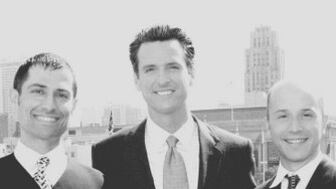When Proposition 8 passed on the same night Barack Obama was elected, it meant trying to feel victorious at the same time my legal gay marriage was evaporating.
For those of us who have married partners of the same sex in California, Tuesday night's passage of Proposition 8, the same-sex marriage ban, was accompanied by multiple waves of déjà vu. California, in 2002, approved the Prop. 22 same-sex marriage ban by a wide margin, and same-sex marriages performed at San Francisco City Hall in the spring of 2004—including my own—were invalidated by the California Supreme Court the following summer.
It happens that I agreed with that decision. I saw the 2004 City Hall weddings as acts of civil disobedience, not as a viable way of deciding a constitutional question. When you perform an act of civil disobedience, you ask to be arrested. If you don't get arrested, the state isn't taking you seriously.

Still, the ruling hurt. So when the court handed down its celebrated decision legalizing same-sex marriage last May, I felt my guard go up. Friends emailed congratulations and I rebuffed them. "Not so fast," I said, referring them to the yet-to-be-named Prop. 8. "Let's save the champagne until after November 4th."
Soon my husband and I realized that the first day of legal gay weddings coincided with the last day that his entire immediate family was going to be in San Francisco. So we began planning a wedding. Thanks to my mother's acquaintance with the mayor through her executive position with the local teacher's union, Mayor Gavin Newsom married me and my husband in his office on the first full day of weddings. The mayor was warm, charming, and perhaps even a little flirtatious. When I told him my husband and I would exchange kisses rather than rings, he said, "Well then we'll face each other and exchange kisses then!" The three of us giggled.
That night our families and friends came together to celebrate progress. And we did not forget the menace of Proposition 8. For gifts, my husband and I asked that people contribute to “No on 8” groups, and I set up a monthly payment to Equality California. But the hoopla, the media coverage, Gavin's charm, the aura of history unfolding, all conspired to pretty much erase whatever caution I had brandished against my congratulations-wielding friends in May.
Tuesday night I took part in the most exhilarating demonstration of political euphoria I have ever seen or heard. It was the sounds that made the most lasting impression, noise erupting from neighborhoods around San Francisco—people screaming, whooping, ululating, banging drums and blowing whistles, helicopters hovering, the nearly unbroken blare of car horns on my walk from City Hall to the Castro. That's when it hit me—seeing Barack Obama's electoral map projected above the intersection where the San Francisco left had gathered to remember its slain leaders, had assembled to riot when their killer was let off, and had sought and found community when plague swept through and touched every single resident. This was an intersection badly overdue for a celebration, and tonight we would have one.
"So!" said a friend I ran into in front of the Castro Theater. His smile was brittle. "What do you think about all these people celebrating their defeat?"
That brought me up short. I had heard early returns showing Prop. 8 winning, but every number I heard was closer—first an 11-point gap, then 9, then 6. At City Hall, someone handed me an iPhone showing an exit poll that had "marriage equality" winning, 52-48. But this friend with the brittle smile extinguished any hope I had—not enough liberal counties remained to close the gap. That gap continued to narrow, but the trajectory toward passage was unobstructed, which soon became clear to the revelers. At about 10 p.m. I left the dancing mob for drinks at a friend's house, and when I returned to the Castro an hour later, the throngs had yielded to the noise of a few stragglers, piles of broken glass and confetti being swept up in preparation for a new day under President-Elect Obama and a same-sex marriage ban in California.
This was the moment I'd thought I was preparing myself for in May, and I hadn't done a very good job. On television, I'd seen the Prop. 8 victory party, a room full of middle-aged straight supremacists hollering with glee at having taken away the rights of a whole class of their fellow Californians. It was the ugliest thing I'd seen since the last Sarah Palin rally I'd watched, and I was ashamed that it was happening in my state. I felt, and feel, betrayed. My anger, in the moment, wasn't so much at the injustice and ugliness of the marriage ban, but at the fact that it had poisoned what should have been an unalloyed experience of triumph that an African-American liberal of superhuman poise and leadership ability with the middle name Hussein, to whom I had given money and time, had just won the presidency. Finally, the country was moving forward, and California had just made a huge lurch in reverse.
My anger wasn't so much at the injustice and ugliness of the marriage ban, but at the fact that it had poisoned what should have been an unalloyed experience of triumph that Obama had just won the presidency.
My husband called it a night after the Prop. 8 news was clear, but I stayed up another few hours and caught up with friends to whom I preached barely felt but deeply held optimism. This is what I said:
In 2000, Californians voted into law a same-sex marriage ban by a 61.4 to 38.6 margin. In 2008, they passed another ban and the margin, with 99.5 percent of precincts reporting, was 52.5 to 47.5. I'm not a statistician or pollster, but it seems to me that if the trend holds, a 2012 rematch on this question would approximately reverse last night's results, giving marriage equality a four-point victory.
What is the future of gay marriage in California and the nation? That's up to the youth of the state, who exit polls show supporting marriage equality by a 2-to-1 margin. If you really want to know who will decide this issue if it comes up in 2012, ask 14-to-17 year olds, who will be voting in their first presidential election. Those straight supremacists playing with Mormon campaign contributions? Culture war dead-enders.
Last night the gay movement lost a battle. The war, launched in the early 1950s by activists Harry Hay, Del Martin and Phyllis Lyon, we're winning decisively. Yesterday morning a USA Today reporter asked me whether I thought the issue had come before the voters prematurely, asking, in effect, whether the Mayor had jumped the gun with his City Hall marriage revolt. He did not. Every opinion poll and every election result in this state show a clear path toward marriage equality, even when we lose. If Newsom had not risked these losses, we would have no path to follow. We win by losing.
I went to City Hall to see Phyllis and Del emerge, married, from Mayor Newsom's office the night before my own wedding, and what struck me, what brought tears to my eyes, was the slow procession of elderly people who preceded them. First came a woman on a walker, then a bent old woman walking with a cane. Finally, to a prolonged roar, came Phyllis wheeling Del in her chair. Del looked so ancient, so exquisitely old, and it hit me in my gut that I was witnessing the triumphant culmination of a half-century's work, courage and leadership. I was in the presence of people who embodied the gay rights movement, among the most courageous and savvy and far-thinking people on earth. Yes, they are impatient, but in a crucial sense, time means nothing to them. Harry Hay died in 2002, Del Martin died nine weeks ago. We live in the world they envisioned for us. They knew they could turn a vision of justice into reality, and if we do not share their faith in our fellow citizens even in this moment of betrayal, we do not understand the depth of their gift to us.
Paul Festa is the author of Oh My God: Messiaen in the Ear of the Unbeliever, which is based on his internationally acclaimed and award-winning film Apparition of the Eternal Church. His writing appears in Nerve, Salon, three editions of the Best Sex Writing anthology, and a 300,000-word novel-in-progress about medical-marijuana farmers.






